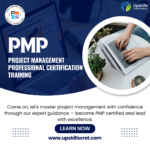✅ Step 1: Understand the PMP Exam Structure
The PMP exam is not just about memorizing concepts—it’s about understanding real-world project management practices. Here’s what to expect:
-
Total Questions: 180
-
Time Limit: 230 minutes
-
Question Types: Multiple-choice, multiple response, matching, hotspot, and fill-in-the-blank
-
Domains Covered:
-
People (42%) – Leading and building teams
-
Process (50%) – Managing technical aspects of projects
-
Business Environment (8%) – Aligning projects with organizational goals
-
✅ Step 2: Check Your Eligibility
Before you can take the exam, make sure you meet the PMI’s eligibility criteria:
Option 1:
-
A four-year degree (bachelor’s)
-
36 months of project management experience
-
35 hours of formal project management education/training (or CAPM certification)
Option 2:
-
A high school diploma or associate degree
-
60 months of project management experience
-
35 hours of project management education/training
✅ Step 3: Apply for the PMP Exam
-
Create a free account on the PMI website
-
Fill out the application form detailing your experience and training
-
Once approved, pay the exam fee:
-
PMI members: $405
-
Non-members: $555
-
💡 Tip: Becoming a PMI member before applying saves money and gives access to resources like the PMBOK® Guide for free.
✅ Step 4: Gather the Right Study Materials
Here are some key resources:
📘 Core Materials:
-
PMBOK® Guide (latest edition) – Official reference
-
Agile Practice Guide – Especially important since PMP now includes Agile questions
-
PMP Exam Prep Books (by Rita Mulcahy, Andy Crowe, etc.)
🎥 Online Courses:
-
Udemy (e.g., Joseph Phillips’ PMP course)
-
LinkedIn Learning
-
Coursera (Project Management courses by top universities)
-
PMI’s own online training
🧠 Flashcards & Podcasts:
-
PMP flashcards (printable or app-based)
-
Podcasts like “PM Happy Hour” or “PMI Projectified”
✅ Step 5: Create a Study Plan
Organize your prep time. Here’s a sample 6-week plan:
| Week | Focus |
|---|---|
| 1 | Study PMBOK Guide (Ch. 1–5) + People domain |
| 2 | Study PMBOK Guide (Ch. 6–10) + Process domain |
| 3 | Agile Practice Guide + Hybrid project management |
| 4 | Take mock exams, identify weak areas |
| 5 | Revisit weak areas, take quizzes, study Earned Value Management (EVM) |
| 6 | Final review + full-length practice tests |
📌 Consistency is key—study at least 1–2 hours per day.
✅ Step 6: Take Practice Exams
Practice exams help you:
-
Get familiar with the question format
-
Learn time management
-
Test your understanding of concepts
Look for:
-
Full-length mock exams (180 questions)
-
Domain-wise quizzes
-
Situational/scenario-based questions
📚 Good sources: PMTraining, PrepCast, Simulator by Rita Mulcahy, and free resources on ExamLabs or PMPrepCast.
✅ Step 7: Join a Study Group or Forum
Being part of a study group or online forum can be very motivating. You can ask questions, get advice, and stay on track.
Recommended communities:
-
Reddit: r/pmp
-
LinkedIn PMP groups
-
PMI Chapters (local communities)
-
Discord/Telegram PMP study groups
✅ Step 8: Focus on Real-World Application
The PMP exam now emphasizes real-life scenarios. It’s not about definitions, but how you’d apply concepts in situations involving:
-
Stakeholder engagement
-
Conflict resolution
-
Change management
-
Agile project delivery
📌 Think like a project manager—choose the “best” answer, not just a technically correct one.
✅ Step 9: Exam Day Tips
-
Get a good night’s sleep
-
Have your ID and confirmation email ready
-
Arrive early (if in a test center) or log in 30 minutes early (if online)
-
Use the optional breaks (2 breaks for online exams)
-
Manage your time—don’t spend too long on one question
✅ Step 10: After the Exam
-
You’ll receive a pass/fail status immediately after the test.
-
If you pass, celebrate! 🎉 You’ll receive your digital badge and certificate from PMI.
-
If not, don’t worry—you can retake the exam up to 3 times within a year.
📈 Bonus Tips:
-
Use the PMP ECO (Exam Content Outline) from PMI to guide your studies.
-
Focus heavily on Agile, Hybrid, and Leadership topics.
-
Practice Earned Value Management (EVM) and Critical Path calculations.

